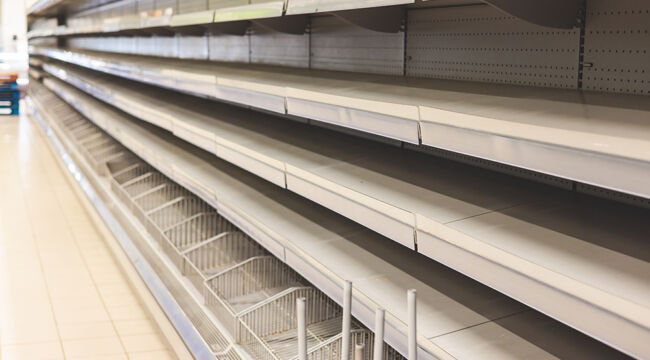Let Them Eat Bugs
A study earlier this year from four prestigious institutions proclaimed that you should eat bugs and spiders.
And not only that. The study — conducted by BI Norwegian Business School (BI), Chuo University, Miyagi University and Oxford University — also said that the way to convince people to do this is to have celebrities do it on YouTube videos.
Like clockwork, they are suddenly everywhere. You are welcome to look them up. I personally find them revolting. As in they make me want to revolt.
These are the same folks who pushed for lockdowns, masking, jabs and a war with Russia. Now they say we have to get used to eating bugs because all the other policies they pushed have dramatically increased world hunger. Indeed, it is reaching a crisis point.
For many people, bug eating will soon be the only answer.
One Step Before Cannibalism
I’m going to take it as a given that the evolution of society selected against bug eating. It is not something people prefer over, for example, eating chicken, fish, beef and vegetables. I would further postulate that most people, in general, would not eat bugs unless they had to.
I’m sure there are many venerable bureaucrats at the UN who would dispute the above, but I don’t care.
There is a name for bug eating: entomophagy. Sounds fancy, but ultimately it means living as if there is a famine going on. It is one step before cannibalism and finally eating tree bark.
Sometimes it happens. We call those periods of history deeply tragic. It’s not what we want. The difference this time is that entomophagy is being pushed by top Hollywood influencers.
When it arrives, the famine will be celebrated on social media.
Food Is Already Scarce
Already you have probably observed the changes that are happening. Restaurants are worried about their profit margins and figuring out ways to work around the squeeze. They are serving mounds of bread and pasta and ever less meat. Even vegetable portions are getting skimpy.
They can’t raise prices the way gas stations can. This is because they have a regular clientele that watches menu prices very carefully. Even a 50-cent increase can prompt consumer protest. Then customers end up tipping less, which is a huge disaster for the server staff that make far less than the minimum wage. Then the server staff quits at a time of huge shortage.
As a result, many are trying to find other ways.
In addition, we are hip-deep into the substitution phase of the great inflation. The pricier items at the store are selling much less while the cheaper stuff is selling well. Out with steaks and in with ground beef. Chicken is the going thing and not the best cuts but the cheap ones.
Another trend: home gardening. People very naively imagine that they will beat inflation by growing their own food. What they discover is that this takes more time than one might expect, and it costs too: the tools, fertilizer, water, nets to keep the bugs off and so on. It all adds up.
And yes, there are moments of great delight but it hardly makes a dent in the grocery bill.
A Hungry World
Meanwhile, people in the First World forget how lucky they really are. Many parts of the world today are facing true food and health crises combined.
The world’s largest and most established humanitarian organization to deliver food has sounded the alarm: The world faces a global hunger crisis of unprecedented proportions.
In just two years, the number of people facing, or at risk of, acute food insecurity increased from 135 million in 53 countries pre-pandemic to 345 million in 82 countries today…
We are at a critical crossroads. We need to rise to the challenge of meeting people’s immediate food needs at scale, while at the same time supporting programs that build long-term resilience at scale.
The alternative is hunger on a catastrophic scale.
We’ll Be Paying the Price for Years
Of course, the elites want to blame climate change and war but the real culprit traces to lockdowns and the supply chains that were shattered as a result of government actions. What a disaster. We’ll be paying for many years to come for this mess.
And while it is easy to dismiss problems around the world as their issues and not ours, I wouldn’t be so confident. The food supply in the U.S. has been profoundly affected by the labor shortage, regulatory overreach, inflation and massive problems in the transportation sector.
Federal crop insurance makes its own contribution to lessening supply. This is a program that pays farmers whether they produce or not. It was designed to mitigate against weather risk but it can also create a situation in which it is more profitable to take fields out of production rather than deal with the soaring costs of fertilizer, gas and labor.
There are zero attempts right now in legislation to do anything about this. In addition, there are massive restrictions written in legislation that prevent private farmers and ranchers from selling their products commercially unless they use a federal government-approved meat processor.
This is simply incredible. Thomas Massie of Kentucky (one of the few really brilliant statesmen in the U.S. today) has tried to introduce legislation to fix this but it is getting no traction.
Get a Cow
You don’t need this advice because you already know it: It’s a good time to get a large freezer and stock up. Many of my own friends have done this. They are also finding ways around the crazy regulations. This is how people get when they start to fear the future. No regulation will stand between us and the desire to eat.
Let’s deal with the elephant in the room: whether and to what extent all of this is deliberate. I resist conspiracy theories but it is undeniable that many of the elite members of the World Economic Forum believe that the world is overpopulated. And not by just a little but by billions.
Is it possible that this food crisis is all being engineered to reduce global population? Maybe. We know that Bill Gates has long championed population reduction. He has had his way on everything else, so why not this?
One does get the feeling these days of a civilization being wrecked by force. Our longevity has been falling for some 10 years, with life spans shrinking for the first time in centuries. This is a terrifying reality. Combine that with an overall health crisis and a food crisis that seems certain to get worse.
Two nights ago, I watched the movie Mr. Jones that covers the Stalin-created famine in Ukraine. Utterly terrifying. It can happen. Famines are nearly always created by governments. When they come, there is no way out. Not even the bug population is large enough to meet our food needs.
It’s an unjust smear of Marie Antoinette that she ever said, “Let them eat cake.” But there is no question that many elites and Hollywood celebs are now telling a world dealing with a serious food crisis:
“Let them eat bugs.”



Comments: